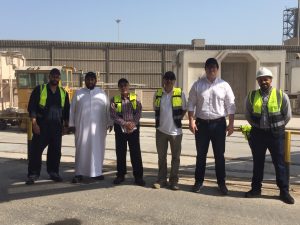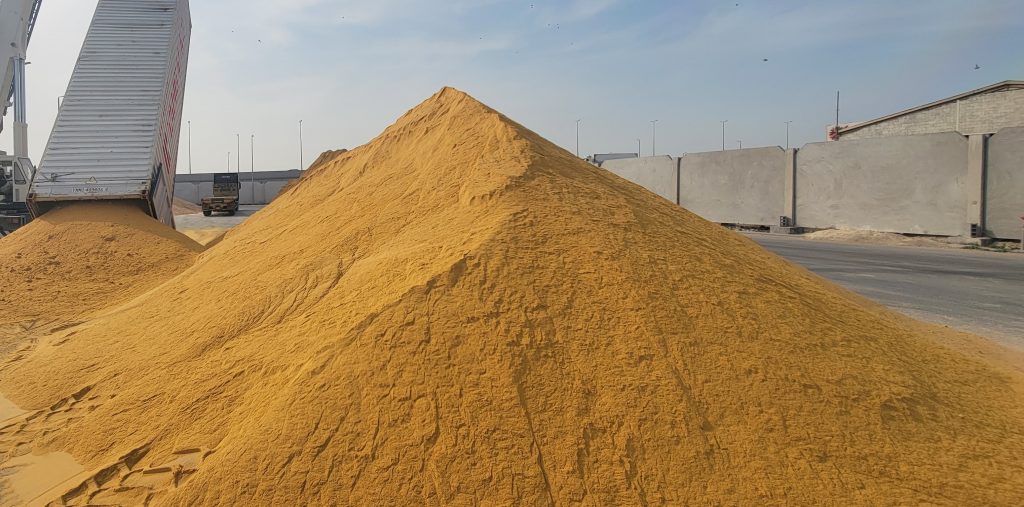The U.S. Grains Council’s (USGC’s) Europe, Middle East and Africa (EMEA) office had two opportunities to promote distiller’s dried grains with solubles (DDGS) last month – at the Besd Bir 6th International Poultry Meat Congress held in Antalya, Turkey, immediately followed by a tour of three Saudi Arabian cities, where Council staff met with industry stakeholders to work on expanding demand for U.S. DDGS.

While at the poultry congress, USGC Assistant Regional Director for Europe and the Middle East Reece H. Cannady spoke about the state of global feed markets to more than 500 members of the Turkish broiler value chain.
“This is a congress we have participated in in the past; however, the post-COVID excitement still lingers on, and attendance was as strong as we have ever seen it,” Cannady said. “It was a great way to get in front of the entire Turkish broiler industry all at once.”
Following the conference, Cannady traveled directly to Dammam, Saudi Arabia, where he met up with USGC regional director for Europe, Middle East and Africa Ramy H. Taieb. In Dammam, the team toured port facilities, while meeting with major feed millers and importers in the area, one of whom was busy unloading cargoes of U.S. DDGS.
“Dammam port’s efficiencies offer a marvelous logistical advantage to Saudi Arabia,” Cannady said. “Not only does the port’s equipment contribute to its capabilities, but also the care with which participating companies and stevedores treat the port ensures its productivity.”
Cannady and Taieb then traveled to Riyadh to meet with trading desk personnel of the same companies they saw in Dammam. Maintaining dialogue between operations and traders allows Taieb and the Council to effectively promote DDGS in animal feed rations in Saudi Arabia.
“Saudi Arabia is a country with massive potential for U.S. DDGS; however, there have been some logistical concerns in the past,” Taieb said. “By speaking with both traders and operations teams, the Council was able to understand just how to help its valued partners in Saudi Arabia save money on their feed rations with minimal logistical hiccups.”
Following the delegation’s visit to Riyadh, they continued to El Qassim, where they met with the largest poultry producers in Saudi Arabia, who have recently gained a taste for U.S. DDGS. The Council provided valued support services to maximize the possibility that they will continue their business with the United States.
“Currently, no other country offers what the Council offers—support from start to finish,” Cannady said. “The Council’s support is just one of many advantages U.S.-origin offers, and we are happy to provide that support to our loyal customers all over the world.”
Saudi Arabia is the largest U.S. corn market in the EMEA region, with average imports of 1.1 million metric tons (MMT) (43,304,800 bushels) of U.S. corn per year over the past 10 years. Saudi imports of U.S. DDGS have struggled by comparison, with imports reaching just under 23 thousand metric tons (TMT) (905,464 bushels in corn equivalent) in 2022.
Taieb says the Council has identified Saudi Arabia for future demand expansion for U.S. DDGS.
“Following the visit in El Qassim, we left Saudi Arabia with multiple future programming ideas,” Taieb said. “Our programs will provide support to the Saudi industry and will result in future DDGS sales from U.S. exporters to the Arabian Peninsula; we are confident in that.”
About The U.S. Grains Council
The U.S. Grains Council develops export markets for U.S. barley, corn, sorghum and related products including distiller’s dried grains with solubles (DDGS) and ethanol. With full-time presence in 28 locations, the Council operates programs in more than 50 countries and the European Union. The Council believes exports are vital to global economic development and to U.S. agriculture’s profitability. Detailed information about the Council and its programs is online at www.grains.org.

